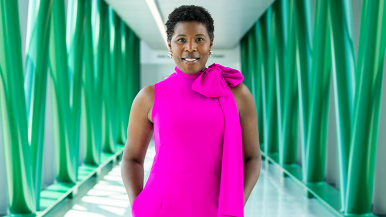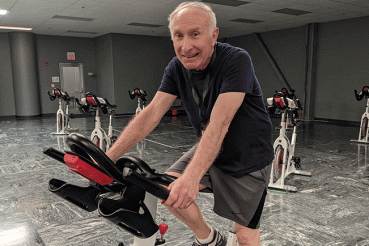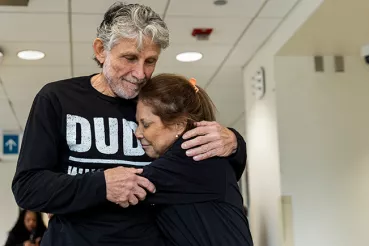Nekeia Wilson, PhD, always stayed on top of her annual mammograms. It wasn’t until the COVID-19 pandemic that — like a lot of women — the streak ended abruptly.
“I’m usually very diligent about my health,” says the Oak Park, Illinois, native. “But with the craziness of the pandemic, I was out of my routine.”
In March 2022, Nekeia discovered two lumps in her left breast. She reached out to her OB-GYN at a local hospital, where she was evaluated and received a biopsy.
Then she got the diagnosis: breast cancer.
“I was devastated,” Nekeia says. “I cried nonstop. To say I was overwhelmed was an understatement.”
At first, Nekeia considered not seeking treatment. “I questioned whether I wanted to fight,” she says. “I was afraid the cancer would destroy me and change the person I am.”
But after researching more about breast cancer, she started to feel differently.
“As a Black woman, I read about the health care disparities. And I started to feel unseen and unheard with the providers at the hospital I was going to at the time,” says Nekeia, who has a doctorate in social work. “With the more I learned, the stronger, fiercer advocate I became. And I realized I was worth fighting for.”
With this newfound determination, Nekeia sought a second opinion at Rush.
Rush stepped in to help
Nekeia contacted her longtime primary care physician at Rush Oak Park Hospital, Catherine Koop, MD, who referred her to Rosalinda Alvarado, MD, a breast surgeon at RUSH MD Anderson Cancer Center, and Paula Grabler, MD, a radiologist at RUSH MD Anderson.
Nekeia’s doctors at Rush reviewed her previous scans and found additional breast cancer, which led her team to recommend that Nekeia redo her tests. And after a needle biopsy, an ultrasound and MRI, they confirmed another small lump in Nekeia’s same breast that was the size of sand.
This new lump ruled out Nekeia’s chance to have what she had originally planned for, a lumpectomy — which is a less-invasive surgery that removes the part of the breast where the cancer is located.
“If only one tumor is found, and it is small, a lumpectomy followed by radiation is an option,” Alvarado says. “But if the cancer is larger or there is more than one tumor in separate areas of the breast — like in Nekeia’s case — a mastectomy, or the removal of the breast, is recommended.”
Nekeia says she’s thankful for her care team at Rush, who were so thorough.
“If I had done a lumpectomy, then I would’ve been right back a few months later with another diagnosis,” she says.
Nekeia felt like things were finally lining up with her care — until it came time to decide about breast reconstruction.
Considering breast reconstruction
While researching her options, Nekeia considered DIEP flap reconstruction, which would use her own abdominal tissue to rebuild the breast. But she became concerned about tissue expanders, which are sometimes used before the procedure to stretch the chest area and prepare for the tissue flap.
“It just didn’t seem right for me,” she says. “So I was scouring the internet trying to find people who look like me who had DIEP flap reconstruction but didn’t have the tissue expander. But nobody talks about that.”
Alvarado says reconstruction, which begins with a tissue expander, may require two to three additional operations. She adds that the risks of expanders, although uncommon, can include infection, and significant discomfort or pain.
“I think part of the reason that some people can be a little bit apprehensive is the commitment to the process and fear of going under anesthesia multiple times,” Alvarado says. “It can be really scary, which is understandable.”
Nekeia chose to delay the decision on reconstruction until after her mastectomy.
‘Going flat’
In May, Nekeia had a unilateral mastectomy — the removal of one breast — at Rush University Medical Center.
“As a surgeon who’s doing a mastectomy without a reconstruction, my number one focus is to remove the cancer — and remove it completely,” Alvarado says. “But I also want to leave the patient with a chest wall that she will be happy with and be able to accommodate different types of clothing, bras and a prosthetic, if she chooses to wear one.”
Nekeia’s surgery was successful, and she is grateful to Alvarado for how her scar turned out.
“Dr. Alvarado came to see me the day after the surgery to lay eyes on my scar and see how I was doing — and I appreciate it so much it brought me to tears,” she says. “I feel very blessed that the surgery went great, and to feel so seen and heard by her.”
Following her surgery, Nekeia ultimately decided she would not have breast reconstruction and chose to “go flat.”
“I was looking for someone to tell me that it was OK for me not to reconstruct my breasts. But I realized that I was that person I was looking for — and that I could still feel beautiful and sexy, even by going flat.”
Care after surgery
After her surgery, Nekeia’s pathology report confirmed that her margins were clear of cancer. It also revealed that her cancer was a stage one, mucinous ductal carcinoma — a rare, invasive type of breast cancer.
To lessen the chance of a recurrence, her doctors then recommended four rounds of chemotherapy.
Nekeia started her first round of chemotherapy in July at Rush University Medical Center and completed her final round on Sept. 2. She continues to have no evidence of the disease.
Nekeia has yearly follow-ups with Alvarado, goes to physical therapy at Rush Oak Park Hospital, wears compression sleeves to prevent lymphedema, and takes hormone therapy to further reduce a recurrence risk. She also receives care through Rush’s Supportive Oncology program to help with the emotional and physical effects of cancer treatment.
Nekeia also credits her Christian faith for her healing, recovery and personal growth — both during and after her cancer treatment.
“I’m trying to get my mind, body and spirit back in line to its highest,” she says. “Even better than it was before I got diagnosed.”
Life after breast cancer
Since her treatment for breast cancer, Nekeia’s life has taken a new direction. She has traveled to Ghana, modeled, walked in New York Fashion Week with other survivors of cancer, and spoken at Rush’s Cancer Survivors Day event.
“Nekeia has come a long way,” Alvarado says. “What’s really inspiring is how she has embraced her body and the person that she is now. The way she is so comfortable and confident through it all is really nice to see.”
Nekeia has a message for other survivors of breast cancer:
“Know that it’s OK to be flat. And it’s OK to get your breasts reconstructed. Do whatever is best for you,” she says. “And know that there’s life after breast cancer. There’s strength after breast cancer. There’s joy after breast cancer. There’s love, there’s peace. There’s all of that and much more after breast cancer.”
Take care of your breast health and book your screening with RUSH MD Anderson Cancer Center.
For appointments within a week, visit RUSH MD Anderson breast imaging centers at Rush University Medical Center and South Loop for quick and convenient care.
Call (312) 942-2027 to schedule your appointment today.




